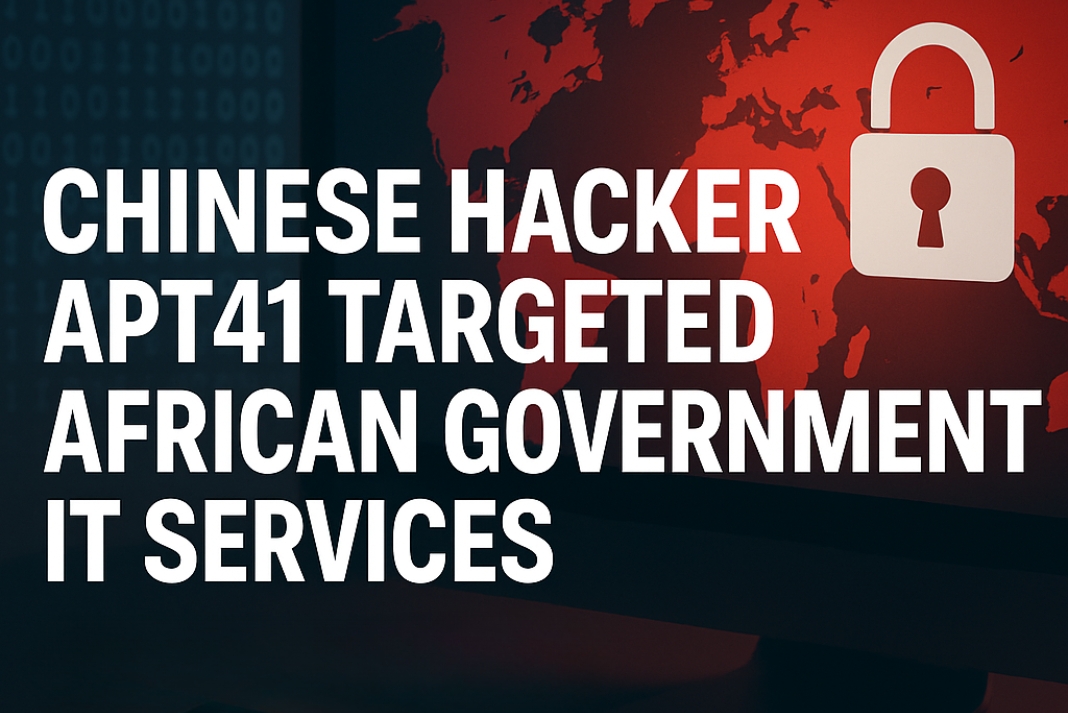Southern Africa Under Attack: Chinese Hacker Group APT41 Infiltrates Public IT Services

A Southern African government IT services company has been the target of a complicated and well-planned cyberattack that is thought to have been planned by the Chinese-linked hacker group APT41. Kaspersky, a cybersecurity company, just found out about the operation. It shows how urgent the weaknesses are in government infrastructure in underdeveloped areas.
APT41 is a Chinese hacker group known for cyberespionage in more than 40 countries. They hadn’t been very active in Africa before. This most recent event shows a worrying change.
“The depth of the attackers’ infrastructure penetration alarmed us,” stated Denis Kulik, Lead Analyst for Kaspersky’s Managed Detection and Response (MDR) team. “They attacked it using the organization’s own reliable software and communication tools.”
How the Attack Unfolded
According to Kaspersky’s telemetry, a publicly accessible web server was most likely the source of the breach. Once inside, the attackers moved laterally across the company’s network using credentials they had stolen. One of the compromised accounts had top-level domain administration privileges, and another had access to almost every employee workstation.
To imitate authentic administrator behavior, the attackers employed sophisticated penetration tools such as Impacket, WMIExec, Atexec, and Cobalt Strike. Worryingly, they even used the popular document-sharing website SharePoint as a secret command-and-control (C2) center.
Kulik compared it to an intruder using your most dependable item as a cover, such as a family photo frame. To make detection even more difficult, they inserted malware into well-known system folders like C:\Windows\Tasks\ and C:\ProgramData\.
“Using SharePoint allowed them to hide in plain sight,” Kulik noted. “It’s like having a spy who blends in perfectly with staff — same uniform, same corridors.”
Espionage Tools: Checkout, Pillager, and Others
To gather a great deal of private data, two strong thieves were used:
- Pillager: An altered program that gathered emails, chat logs, browser histories, Wi-Fi login information, saved passwords, and even source code from internal projects.
- Checkout: Emphasised on personal and financial browser information, such as download history and credit card details.
- Furthermore, the attackers extracted raw registry files (SAM, SYSTEM, and SECURITY) directly using RawCopy.
- Mimikatz, which harvests system-level credentials by hiding inside a Java executable.
Additionally, the attackers downloaded malicious scripts and remotely created reverse shells using decoy websites, which mimicked Microsoft and GitHub domains, granting them continuous access even in the event of detection.
The Significance of This for Africa and Beyond
Even though significant cyberattacks on Western targets frequently make headlines, this breach highlights a sobering fact: emerging countries are now high-value targets, even though they frequently lack the means to defend themselves.
This was an attack on a nation’s digital sovereignty rather than merely a data breach. Every stolen document, password, or email has the potential to jeopardize national security or even public safety.
According to a regional cybersecurity officer who asked to remain anonymous, “the damage is not just technical—it’s institutional and human.” “It erodes public confidence in digital services.”
Kaspersky’s Advice
Kaspersky suggests the following measures to protect against potential threats:
- Complete endpoint protection for all systems.
- Preventing user or service accounts from having too many admin privileges.
- Using EDR/XDR solutions that offer real-time response and visibility.
- Using incident response and managed detection services when internal resources are scarce..
According to the report’s conclusion, “this case proves that ignoring ‘low-risk’ regions is a dangerous assumption.” “Cybersecurity needs to be global and inclusive.”
A Wake-Up Call for the World
The invasion of Southern Africa by APT41 serves as a reminder that no country is too small or remote to be a target in the digital age. Furthermore, democracy, infrastructure, and public trust are all at risk when vital government systems are compromised, not just data.
The post Southern Africa Under Attack: Chinese Hacker Group APT41 Infiltrates Public IT Services appeared first on Digpu News.
News